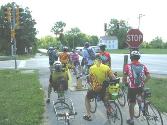| POLICIES AND PROCEDURES
Cell Phones
Recommended
Service Carriers • Text
Messaging • Power
and Battery Life
 Cell
phone coverage is generally excellent because our routes generally
parallel major
highways and pass through many populated
areas. Cell
phone coverage is generally excellent because our routes generally
parallel major
highways and pass through many populated
areas.
Although we do not require you
to have a cell phone to participate, if
you do not have a cell phone, get one for our events.
If you don't want to get a cell phone long term, we recommend
either borrowing one for the event or getting a pay as you
go type phone plan.
Above and beyond anything else, having
a cell phone could save your life should a life-threatening
medical emergency arise. You can save precious time
and contact emergency medical services directly yourself
rather than relying
on us if you don't have a cell phone, which could
literally mean the difference between life and death
in an emergency situation.
You should carry your cell phone
with you at all times. This includes while you are
riding, at the rest stops, and in our stopping towns.
It
is
quite
likely
that
we, another participant, or someone else not participating
in the
event will
need to contact
you directly while you are participating in the event,
especially in case of an emergency.
You should have your cell
phone turned on
and at
both the
maximum
ringer volume and on vibrate if possible so you
can both hear and feel your phone,
considering
there will be such background noise as wind and other
people, among other things. You should
keep your cell phone located where you can
easily
hear and/or feel it, such as in your jersey pocket
when you are riding or in your pants pocket when
you are not.
Recommended Service Carriers
For service carriers
we recommend using either AT&T or Verizon. Our
staff will use AT&T and since AT&T customers
get free in-network calling neither you we will
use any minutes to communicate. If you prefer, Verizon
supposedly has the best coverage across Illinois
from what we've heard, but we have yet to verify this
ourselves.
Don't choose T-Mobile
since their coverage is lousy along our routes from
our experience. We haven't had any significant
experience with any other carriers, and can't
give any other recommendations. If you have had any
experience with any other cell phone carriers across
Illinois, good or bad, and would like to share your
experience for the benefit of other participants
we would greatly appreciate hearing about it!
Text Messaging
To account
for unlikely but potential lapses in consistent cell phone coverage you
can also send us a text message in case you are unable to call us directly.
Text messaging has
proved
very useful in the past since text messages will sit in a queue until
there is an adequate signal for them to be sent and don't require a
long consistent signal, as opposed to trying over and over again to talk
to us only to
be cut off from poor coverage. Please try calling us first before texting
though since direct voice communications are by far the best way to communicate
and we
and you both may have to pay for each text message sent and received.
We will not be responsible for any charges you
incur as a result of us sending you a text message.
Power
and Battery Life
It is very important that you remember to
charge your cell phone at night before the ride the
next day.
Relatively short battery lives can be a major issue
with cell phones, particularly smartphones. By far
the most common way a cell phone will fail on the
road is
simply
running
out
of power
and is best prevented through proper personal planning
beforehand.
- Click
Here for more information about
personal electronic device power sources and
how to be personally prepared against running
out of power for each type.
If your cell phone runs low or out of power on the
road, you will be able to charge it as long as you
need to at any rest stop location that has operational
electrical outlets.
- Click
Here for more information about
on road support for personal electronic devices.
Using Your Smartphone as a GPS Navigation Device |

